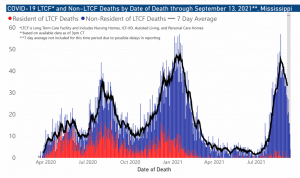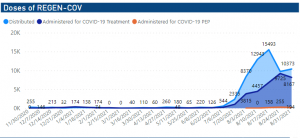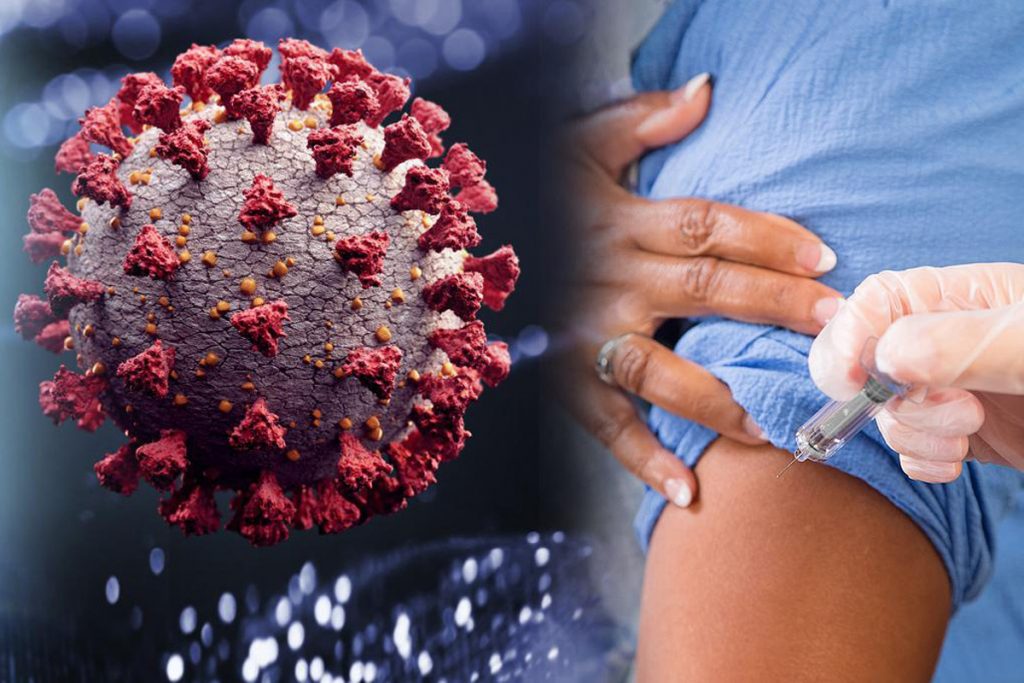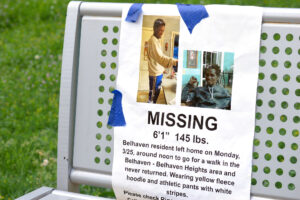The delta wave of COVID-19 continues to recede in Mississippi, with average case numbers dropping day after day since the late August peak. Today, the Mississippi State Department of Health announced 2,070 new reports of COVID-19.
Experts have suggested that delta’s significantly increased infectivity may cause it to surge through populations at a faster rate than earlier forms of COVID-19. In August, Dr. Eric Topol summarized delta’s quick descent in countries like India and the U.K. “We know it moves faster and more efficiently than other viruses as well. So what appears to be the case? It burns through, and then as soon as it can’t find hosts, its descent can be as quick as its ascent, in terms of the number of cases that it generates,” Topol told the Mississippi Free Press.
But death reports remain consistently high, with 85 new deaths reported alongside Tuesday’s case totals. Forty-two of the deaths occurred in the previous week, 43 coming sometime during August and early September. By the New York Times’ estimate, based on older census estimates, Mississippi is on track to become the nationwide leader in COVID-19 deaths per capita, with 302 per 100,000, compared to New Jersey’s 305 per 100,000. The Mississippi Free Press’ own accounting of the numbers, based on updated Census data, show that the state has just recently surpassed New Jersey to become the national leader in COVID-19 fatalities.

Mississippi would become the first state in the U.S. to lead the per capita death totals that did not experience the majority of its deaths in the first days of the pandemic. Northeastern states surrounding the epicenter of COVID-19’s arrival in this country experienced a short, uncontrolled surge in deaths in early 2020.
In contrast, Mississippi’s deaths are scattered across the entire length of the pandemic, with spikes in mortality following 2020’s summer surge, the winter surge that debilitated most of the U.S. and the present and ongoing Delta variant surge.
Notably, very few of Mississippi’s newest deaths are coming from its long-term care facilities, which are heavily vaccinated. During the earliest days of the pandemic, a significant portion—sometimes more than 50% of any given day’s COVID-19 deaths—came from the state’s heavily infected nursing homes and care facilities.
Mississippi Leads In Use of Monoclonal Antibodies
Mississippi’s high rates of infection have led it to become a significant user of monoclonal antibodies, the only post-infection intervention that medical experts have credited with significant demonstrated effectiveness at reducing hospitalization and death. Mississippi has seen the use of tens of thousands of doses of monoclonal antibodies, the vast majority during the delta wave, likely thanks to the numerous antibody clinics set up in places like the University of Mississippi Medical Center.
Treatment through monoclonal antibodies, in addition to reducing hospitalizations and mortality from the virus, has the side effect of reducing medical costs associated with serious cases of COVID-19.

State Health Officer Dr. Thomas Dobbs estimated that every shot of monoclonal antibodies saved thousands of dollars in charges. “In MS – average charge for COVID admission is $72k, based on the current Medicare outpatient infusion rate for the drugs, $450, every dollar spent on the infusion of mono-clonal antibodies save(s) $9. Or, for every 16 infusions we could save $64,800 based on charges,” Dobbs wrote on social media.
But while health-care experts continue to tout monoclonal antibodies as the best option post-infection, the evidence supports vaccination pre-infection as the best option for preventing transmission, hospitalization and death.
No Link Between Vaccine and Miscarriage
Significant research data continue to accrue supporting the safety of the COVID-19 vaccines. A raft of new studies have recently emerged finding zero evidence of heightened risk of miscarriage post vaccination based on observation of many thousands of pregnant women before and after vaccination.
The Vaccine Safety Datalink surveillance team produced research finding no relationship between vaccination and miscarriage in a survey of more than 100,000 pregnancies. The University of Minnesota’s Center for Infectious Disease Research and Policy summarized the results simply. “Overall, miscarriages were no more likely within 28 days of vaccination compared with ongoing pregnancies regardless of type of vaccine and gestational age,” it reported.
A Centers for Disease Control study came to the same conclusions as the Datalink investigation, finding that “the estimated risks are consistent with the risks of (miscarriage) reported in the general population.”










